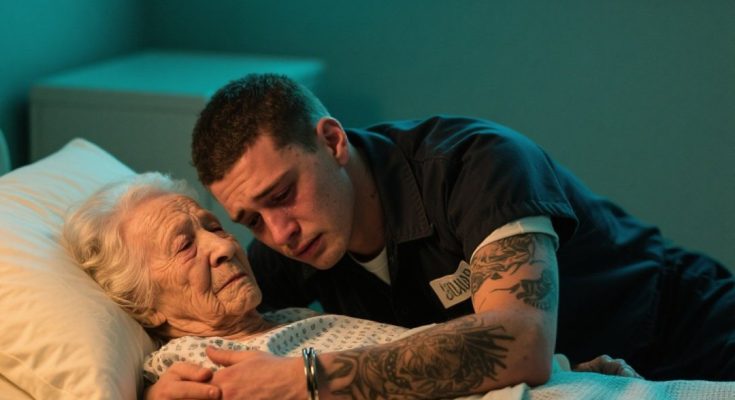Joey, 25, had spent the last three years in the state correctional system, where he was not just a number but a troublemaker, ready to confront anyone. The tattoos on his face made people avoid him, and his fiery temper made his name a source of fear among inmates and guards alike. But Eleanor, Joey’s grandmother—the only person who ever saw beyond that tough exterior—had raised him since he was a child.

Joey’s childhood had been far from easy. His parents died in a tragic car accident when he was just ten years old. The entire family was caught in a catastrophic crash, leaving Joey as the sole survivor. Alone and devastated, he had no one to care for him—until Eleanor, his grandmother, took him in.
Eleanor was already in her sixties, frail and with limited resources, yet she did not hesitate. She accepted the responsibility of raising Joey despite the challenges ahead. She stayed by his side through the years after the accident, encouraging him to step forward from the pain and loss. She taught him love and resilience, even when she herself struggled to comfort him. She was the one constant in his life, the only person who never gave up on him, never judged him by society’s standards.
But youth and buried pain are difficult to control. Joey struggled with his grief and the absence of his parents. He often lashed out in fights as a way to vent his emotions. Eventually, his rebellious behavior led him to prison at the age of 21, after a serious altercation with an old friend over a trivial dispute.
During his years behind bars, few dared to approach him. But Eleanor remained his lifeline. Despite every call being a collect call, despite seeing her grandson as a grown man behind glass, she always answered. She continued to call him “Joey-bear,” just as she had since he was a little boy.
Then one day, Joey received devastating news. Eleanor was in the hospital; her heart was failing. Doctors had moved her to end-of-life care. Joey’s chest tightened, disbelief and grief colliding within him.
After two days of relentless pleading and negotiation with the prison authorities, Joey was granted a four-hour compassionate furlough. It was his only chance to see her one last time.
He walked down the hospital corridor, each step heavy and echoing in the quiet halls. The guard beside him remained silent, but his eyes never left Joey, understanding the gravity of the moment.
The door to her room opened, and Joey saw her lying in bed, fragile and small, like a dry leaf about to fall. When Eleanor opened her eyes, they immediately found his. A faint smile appeared on her lips.
“Joey…” she whispered, her voice fragile as a thread.

He sat beside her, taking her paper-thin, trembling hand into his. His tattooed fingers covered hers, and in that moment, he felt the unconditional love she had given him all these years.
“You have to promise me something, baby,” Eleanor said, squeezing his hand. “No more fighting… no more prison. I need you out there… living. Do you hear me?”
Joey choked back tears. “I… I promise, Grandma,” he whispered. “I’m done with that life. I’ll come home for good. I promise.”
She gave a faint, tired but gentle smile. “That’s my boy,” she whispered. “That’s Joey-bear of mine.”
He stayed with her for hours, sharing small changes in his life—how he had learned to take care of himself, how he avoided fights in prison, and how he had started reading again after years. She listened, her eyes glistening, occasionally reaching up to touch his tattooed cheek.
When the nurse gently reminded him that time was almost up, Joey stood, holding her hand one last time. “I’ll come back,” he said, voice trembling. “I’ll come back for you, Grandma.”
She closed her eyes, her smile still soft, and whispered, “I’ll always be with you, Joey-bear.”
Eleanor passed away peacefully a week later. Joey attended her funeral, standing silently, tattoos hidden beneath a black suit, his eyes fixed on the coffin carrying the only person who had never abandoned him.
Since that day, Joey has changed. He avoided conflicts, enrolled in classes, and helped younger inmates. People started to see him differently—not with fear, but with respect. Each night, in the quiet of his cell, he whispered his promise to her: I will live… for you.

And sometimes, in the stillness of the night, he imagined Eleanor smiling at him, nodding proudly. That memory became his anchor. The promise he made in that hospital room became his compass—and for the first time in his life, Joey truly felt free.



